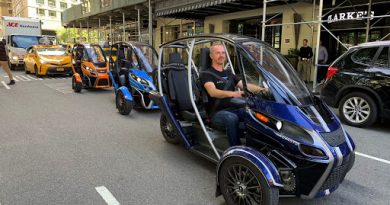Golf Cart Companies Can’t Keep Up With Demand During Pandemic
Thanks to the coronavirus pandemic, it’s a seller’s market for golf carts.
After more than a year of staying in, Charleston residents desperate for stimulation have turned to thrills closer to home: golf carts and low-speed vehicles.
While golf carts have long been a leisurely, energy-efficient vehicle for many Charleston families — even those who live nowhere near a golf course — local companies say demand over the past year has outpaced production.
“This is the busiest we’ve ever seen,” said Danielle Smith, owner of Charleston Custom Carts, which opened in 2017.
“Last spring and summer, we were selling 50-60 carts a month and if I had 100 carts, I could have sold 100,” said Andrea Leary, who co-owns Rad Rydz Golf Carts in Mount Pleasant with her husband Chad Shores. “Our biggest issue is finding golf carts to sell. We can’t keep them in stock.”
Historically, the busy season for golf cart purchases is when tax returns are processed and people are flush with cash. Business owners report that 2020 bucked that trend, with a constant demand for carts all year.
Yet, COVID-19 related manufacturing shutdowns and shipping delays has made getting new golf carts and replacement parts a challenge.
“Just getting seats upgraded is a 20-week lead time, because the wood backing that goes on the seat is being used by toilet paper companies,” Smith said.
Rad Rydz gets their inventory from golf courses that upgrade golf cart fleets and sell them retired carts. Leary said golf cart manufacturers are behind on making new carts, which has in turn halted their inventory.
“E-Z-GO and Club Car are months and months behind because of COVID-19, so golf courses are holding onto their fleets,” she said.
Leary and her husband have secured carts from out-of-state golf courses to keep up with demand. They hired an 18-wheeler to transport carts from Florida and have picked up carts themselves.
“This past weekend, my husband and I went down to Florida and brought home 10 carts,” Leary said. “We have a trailer that holds six, another trailer that holds three, and we put one in the back of a truck.”
Golf cart parts and accessories like tires, rims and lift kits, often shipped from China, are also backordered because of the pandemic, making custom work take longer than usual.
“Every time we get an opportunity to order more parts, we order in bulk,” Smith said. “Pretty much every custom cart around Charleston has a 14-week lead time no matter where you go,” Smith said.
High demand, low inventory and higher prices for parts has resulted in the price of golf carts to go up significantly.
“People on Facebook are asking why their friend paid $4,500 for a cart a year ago and today it’s $6,500,” Leary said. “But I’m paying $1,500 to $2,000 more per base cart before I do anything custom to it; that’s why the price of carts has gone through the roof.”
Both Rad Rydz and Charleston Custom Carts have golf carts starting at $5,000. Golf carts at Charleston Custom Carts can go as high as $8,000. The most expensive low speed vehicle Charleston Custom Carts has sold was $26,000.
Business owners say higher prices aren’t deterring customers.
“Customers spent money prior to pandemic on family vacations and kid’s camps and when those were canceled, they got their money back and thought, ‘What can we do that’s family-oriented?’ They bought pools and boats and golf carts,” Smith said. “Now, they can ride around the neighborhood, get out and socially distance. The more people have them, the more other people see them on the road, and the more other people want them.”
There has been such an uptick in golf carts operating on roadways that the City of Charleston has begun cracking down on regulations for carts, including making sure carts are registered with the S.C. Department of Motor Vehicles and following guidelines for parking. It costs $5 to register a cart and owners must supply proof of insurance.
Smith said the crackdown on regulations has prompted more interest in low-speed vehicles that can legally be driven at night with headlights, a windshield, seatbelts and turn signals.
Leary said more people have been requesting custom carts with higher speeds to drive on busier roadways, to grocery stores and more.
“A low-speed vehicle cannot go over 25 miles per hour, but with a golf cart, I can get them up to 40 miles per hour,” she said.
As the weather gets warmer, business owners are preparing for another wave of demand. Charleston Custom Carts just got a new fleet of new Yamaha carts and Epic brand low-speed vehicles. Rad Rydz has secured the purchase of 100 additional golf carts.
“I’ve had 15 calls about golf carts just this morning,” said Leary. “People used to come and see carts and then go home to think about the purchase, but once COVID hit, I’d have to tell them, ‘I’m not trying to give you a hard sell…but they will be gone by tomorrow.’ Now, I just keep a waiting list.”
SOURCE: | https://charlestonbusiness.com/news/automotive/80346/



